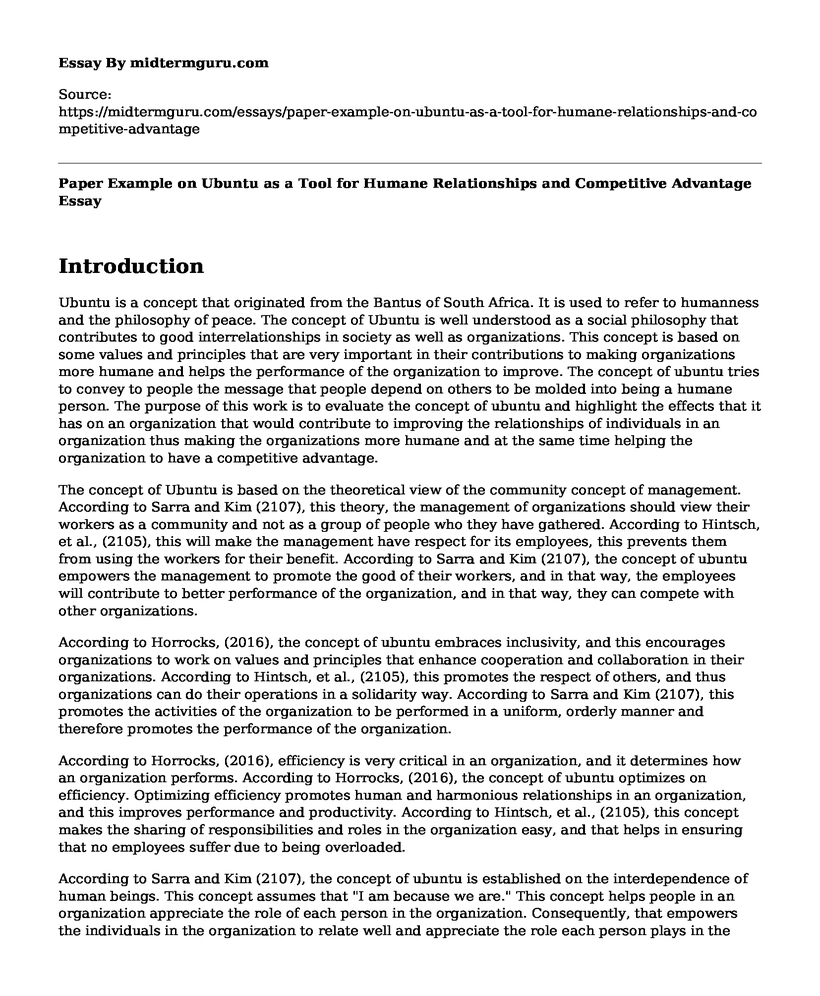Introduction
Ubuntu is a concept that originated from the Bantus of South Africa. It is used to refer to humanness and the philosophy of peace. The concept of Ubuntu is well understood as a social philosophy that contributes to good interrelationships in society as well as organizations. This concept is based on some values and principles that are very important in their contributions to making organizations more humane and helps the performance of the organization to improve. The concept of ubuntu tries to convey to people the message that people depend on others to be molded into being a humane person. The purpose of this work is to evaluate the concept of ubuntu and highlight the effects that it has on an organization that would contribute to improving the relationships of individuals in an organization thus making the organizations more humane and at the same time helping the organization to have a competitive advantage.
The concept of Ubuntu is based on the theoretical view of the community concept of management. According to Sarra and Kim (2107), this theory, the management of organizations should view their workers as a community and not as a group of people who they have gathered. According to Hintsch, et al., (2105), this will make the management have respect for its employees, this prevents them from using the workers for their benefit. According to Sarra and Kim (2107), the concept of ubuntu empowers the management to promote the good of their workers, and in that way, the employees will contribute to better performance of the organization, and in that way, they can compete with other organizations.
According to Horrocks, (2016), the concept of ubuntu embraces inclusivity, and this encourages organizations to work on values and principles that enhance cooperation and collaboration in their organizations. According to Hintsch, et al., (2105), this promotes the respect of others, and thus organizations can do their operations in a solidarity way. According to Sarra and Kim (2107), this promotes the activities of the organization to be performed in a uniform, orderly manner and therefore promotes the performance of the organization.
According to Horrocks, (2016), efficiency is very critical in an organization, and it determines how an organization performs. According to Horrocks, (2016), the concept of ubuntu optimizes on efficiency. Optimizing efficiency promotes human and harmonious relationships in an organization, and this improves performance and productivity. According to Hintsch, et al., (2105), this concept makes the sharing of responsibilities and roles in the organization easy, and that helps in ensuring that no employees suffer due to being overloaded.
According to Sarra and Kim (2107), the concept of ubuntu is established on the interdependence of human beings. This concept assumes that "I am because we are." This concept helps people in an organization appreciate the role of each person in the organization. Consequently, that empowers the individuals in the organization to relate well and appreciate the role each person plays in the organization. According to Hintsch, et al., (2105), this concept makes the management builds on a framework that promotes the appreciation of their employees, and that promotes the efforts that each of them makes in the organization. According to Sarra and Kim (2107), this leads to an improvement in the performance of the organization since each strives to give their best and in that way the management can build on a sustainable competitive advantage.
Conclusion
In conclusion, it is clear that the concept of Ubuntu is very important in the management of organizations since it promotes the association, cooperation, and interrelationships and thus promotes the performance of organizations through increasing the productivity and therefore empowers the organization's competitive advantage.
Work Cited
Hintsch, Johannes, Carsten Gorling, and Klaus Turowski. "Modularization of Software as a Service Products: A Case Study of the Configuration Management Tool Puppet." Enterprise Systems (ES), 2015 International Conference on. IEEE, 2015.
Horrocks, I. R., et al. "SOMM: Industry Oriented Ontology Management Tool." (2016).
Sarra, Janis, and Kim Berman. "Ubuntu as a Tool for Resilience: Arts, Microbusiness, and Social Justice in South Africa." Conflict Resolution Quarterly 34.4 (2017): 455-490.
Cite this page
Paper Example on Ubuntu as a Tool for Humane Relationships and Competitive Advantage. (2022, Oct 05). Retrieved from https://midtermguru.com/essays/paper-example-on-ubuntu-as-a-tool-for-humane-relationships-and-competitive-advantage
If you are the original author of this essay and no longer wish to have it published on the midtermguru.com website, please click below to request its removal:
- Business Ethics Reflection Paper
- Failed Startup of the Quirky Company - Analysis Paper Example
- Leadership in Nursing: Presentation
- Collective Leadership and Strategic Change in Healthcare Organizations - Essay Sample
- Organizational Training: Enhancing Employee Development & Performance - Essay Sample
- Bed Bath & Beyond Inc: Careless Leadership Leads to Troubles - Case Study
- Attracting and Retaining Top Talent: The Power of Incentives - Essay Sample







